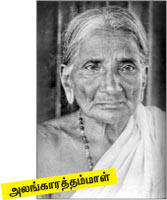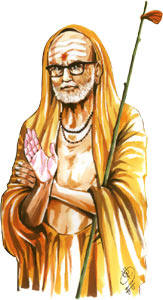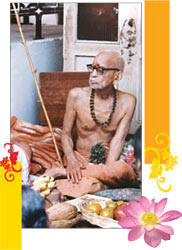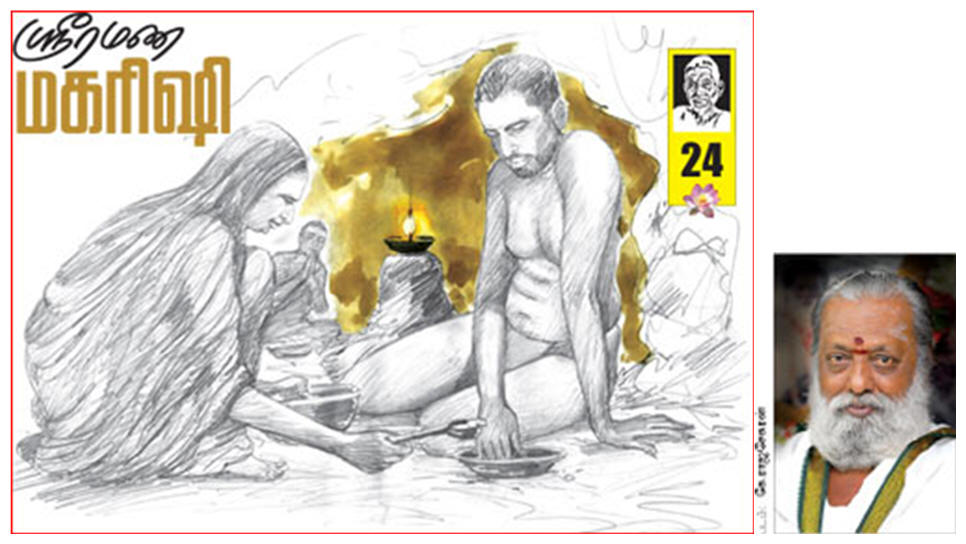சக்தி விகடன் -
08 Mar, 2011
Part 1 & 2
Sri Ramana Maharishi
Author: Balakumaran
Thillaiyādi
town was near Kāraikkāl.
A woman named Alaṅgāraththammāḷ
lived with her son and daughter-in-law.
She volunteered her services to an old ascetic, whose final days
were imminent. The family trio asked him with grief, ‘What is our
condition after you (are dead)? He said, “There is a Muni Bālaswāmy,
more endowed with spiritual wisdom than me in Tiruvannamalai. Go serve
him. That lucky service will take you to Mukti (liberation).
When the ascetic attained Samadhi (death),
Alaṅgāraththammāḷ,
son Subbaiah and her daughter-in-law went to Tiruvannamalai and had
Darśan of Bālaswāmy. There was an effervescence of joy. She came back to
Kāraikkāl, entrusted her property to a person, came back to
Tiruvannamalai with cash given by him, lived in a rental property and
received daily darśan of Bālaswāmy. She prepared food for Bālaswāmy in
the foothills and carried it to him. Simultaneously Ecchammāl also
brought food. Because of the number of devotees, the food from the two
became necessary. The cash flow from Kāraikkāl was gradually dwindling.
It became difficult to meet the family expenses.
Subbaiah suddenly showed up in Tiruppaṉanthāḷ
Mutt, became a sannyasi, an ascetic, wandering from town to town.
Following this,
Alaṅgāraththammāḷ
and daughter-in-law sold cooking oil and thin fritters (Pappad) and used
that money to supply food to Bālaswāmy. She a woman from Vaisya caste,
surrendered to the eminent Jñāṉi. whatever happened in her life, her
priority was service to Bālaswāmy. Because of poverty, she did not like
leaving town and becoming a false ascetic. It became apparent to her,
that Bālaswāmy lived a life of simplicity and privations. She thought
living a simpler life than his is laudatory.
Despite
the cash crunch, she did not stop bringing food for Bālaswāmy.
She made food balls and dropped them on his palms. He said, “Grandma,
the food balls are increasing in size day by day.” Alaṅgāraththammāḷ
said, “Big or small, it is all in the mind. “He celebrated her with a
smile saying, “Adadā,
what I taught, granny turns around.”
The
Āśram
took shape at that time. It became more difficult for Alaṅgāththammāḷ to
supply food. She became weakened by age. Many told her, “Why go through
so much trouble?
Āśram
will care for Bālaswāmy.” She replied with a vow, “To the last day of my
life, it is my job to supply food for Bālaswāmy. No money, so what? Body
infirm, so what? I will walk with a stick, beg and collect food.
When the food is distributed in the Āśram, a little bit of food prepared
by Alaṅgāraththammāḷ
is given to Bālaswāmy. That
day, her prepared food was not served to Bālaswāmy. He did not eat the
food. When her food was added, he ate. This is proof of his high regard
for her as his disciple.
Bond between Guru and his disciple Alaṅgāraththammāḷ
is firm, mature and complete.
Swamy never gives up on those who surrendered to him. He lived a
life of no ostentation and graced the followers with that gift. His
servitors realizing it lived a life of simplicity.
One day, Bālaswāmy came down from the Virūpākṣi cave and circumambulated
the mountain. Later, on his
way back, he took a shortcut to the cave.

He felt unhappy at causing possible damage to the beehive. There was a
sudden burst of honeybees stinging his left leg. Anybody else would have
taken to his heels under the circumstances. They would have used the
upper garment to beat with intent to kill them. They would have told
that they did not step on the beehive on purpose and it was an accident.
They would have set fire to the beehive.
But, Swamy did none of that. ‘Though done accidentally, the mistake is
mine. I destroyed the beehive. Who knows the extent of damage to the
beehive? Who knows the amount of hardship the bees suffered because of
me? They stung me in anger. They did not chase me while I walked. They
became angry upon my stepping on their hive. They pursued their Dharma.
How can I run and hide? How could I escape from my mistake? Your (bees’)
anger is justified. Go on, sting me. Sting me until your anger
dissipates. Thinking like that, he kept the left leg in place until the
honeybees finished with their stings (and became quiet again).
Once he found no honeybees were buzzing around, Bālaswāmy walked. Severe
pain. It was a fiery pain. He forgot all about the flying banyan leaf
that landed on him, the banyan tree and the Siddhar under the tree.
Taking a detour, he went to the Jataiswāmy
cave, where fruits and milk were given to Swamy. Taking a breath and a
little rest, he came home to Virūpākṣi cave.
The thigh was swollen.
The pain was so severe he could not move.
No one paid any attention.
Noticing the swelling, Pazhaṉisāmi was upset. Upon enquiry, ‘what is
this?’, Swamy narrated the incident. Next day, oil was applied to the
thigh and Pazhaṉisāmi removed the embedded stings by feel. In the next
few days the swelling went down.
Muruganār
‘It was an accident.
Would anyone bargain for honeybee stings?
Why would you seek punishment as if you did injury intentionally?
His disciple Muruganār
questioned him in his poem, Bālaswāmy replied to it in a poetic grace.
As the disciple asks,
Bhagavan
answers in a poetic form.
This was an accident. But, it is a mistake. There is punishment. To run
to escape punishment and hide: what nature is it? (Is it justice?)
It is man’s nature to escape from punishment. It is common to punish the
perpetrator (tormentor).
This Jñāni has one perspective and one relationship with all
living things. The honeybees are
not insignificant. Their living quarters are not ordinary. Though injury
was done accidentally, it is proper to accept their anger and
punishment.
Bālaswāmy is the pinnacle of Jñānam;
to know it as such makes your hair stand on end and body tremble. Did
this event take place to erase memory of existence of Aruṇagirisiddhar’s
living place known as Vadavālam?
Many days later, Bhagavan Ramanar said, “It is not so.”
He elaborated further, “There was a huge banyan tree on a rock. I wanted
to see the tree close, so I wanted to cross a stream to go to the other
side. Before that, I
stepped on the beehive. I forgot to go and see the banyan tree. That is
it.”
The banyan tree is not important here. The stress is on the respect and
the love for all living beings. Ahimsa
towards any living being is the eminent quality. He did not try to
elicit sympathy by telling many people about the pain he suffered from
bee stings.
Bhagavan’s acts are meaningful and adhere to Dharma.
Kanchi Mahan: The Deity of Mercy (Author)
(Author)
Chennai. Maṇimēkalai
Street in Puthupperuṅkaḷaththūr.
Kāmātchidāsan
Srīṉivāsan
lives with Srīliṅgam
family. He hails from Uththamathāṉapuram in Tanjore district. His father
is Venkatrāmaiyar who served in Kanchi Mutt from 1901 to 1966 as a
manager.
K. Srinivasan -18 years of age- shared his experience of his first
encounter with Kanchi Mahāperiyava, and announced proudly that he became
the slave of Periyava.
“My father served in the Mutt from before Mahāperiyava became the
Pīdāthipathi. Periyava used to learn a few things from my father,
Venkatrāmaiyar.
Periyava was friendly with my father.
When my father came back home, I used to tell him to take me to
Periyava. The time never came. My father used to postpone it for another
day in the future.
That was 1958. I woke up
one day suddenly in the middle of the night. I felt I received divine
grace. I began narration of Kāmātchiammaṉ 1000 Ahavals and later wrote
them line by line. In one hour, I in a state without body awareness
finished writing all 1000 Ahavals. I don’t know how this feat came
about. I told my mother.
Alas, she did not understand. She told me to write a letter to my
father so he could tell Periyava about it.
At that time, Periyava was camping in Chennai Sanskrit College. As soon
as my father told Periyava, he said, ‘ask Srinivasan to come me.’ On his
orders, I came to Chennai. 
There was a huge crowd in the college. KVJ, Kirupāṉanthavāriyār
and other VIPs were there.
I stood before him in a humble manner.
Periyava said, ‘Read, Srinivasa.’ I read it fast. When I read the
line, ‘64th Pīda
empress, Praise to You!’ he stopped me.
He asked the doors of the room closed. He offered me, a sheared
coconut, a ball of sandalwood paste, Guru’s footwear, one Sri Chakram,
Bael leaf and said, ‘use them for Pañcāyatana
Mūrthys
Pūja.’
I stood there confused and said, “What am I to do? I have no idea of the
procedural elements of Pūja.”
Periyava gave me a smile. Does Periyava not know how to answer an eager
student?
He asked me, ‘How did you write ‘Ahaval of praise.’
‘I did not write. It came on its own accord, Periyava!
Periyava gave his blessings in the manner of Pūrṇa
Anugraham and said, ‘The manner of doing pūjā
will come on its own. Do
the Prayer for World Welfare. Supplicate all should be well. Do prayer.
‘I must have been a blessed person.
As the eyes were raining tears with Srinivasan in touch with his
heart and soul, he narrated Periyava’s coming to his house as his
special favor.
I did Puja as advised by Periyava. Three years went by. On February 22,
1916, Periyava without notice came to our house in Uththamathāṉapuram.
In the prayer room, I had a wooden temple, in which I kept all that
Periyava gave me for the daily puja. Periyava sat and leaned against the
bureau by the side in the room. I performed Puja to the resident five
deities and Periyava. In the name of Ambal and Periyava, I did
flower-puja. My heart and soul were satisfied.
Not that alone? Periyava
bought for me a cow from Maṇappāṛai,
since cow milk is necessary for Puja. Srinivasan’s face lighted up.
 “Mahāperiyava’s Sandalwood paste is growing bigger from accretion. The
tender coconut is still there. Friends and devotees drop in for SrīKāmātchi
Puja and share with me, their supplications, prayers and worship are
bearing fruits and happiness, which made me happy for them.
All due to Mahan’s mercy!
“Mahāperiyava’s Sandalwood paste is growing bigger from accretion. The
tender coconut is still there. Friends and devotees drop in for SrīKāmātchi
Puja and share with me, their supplications, prayers and worship are
bearing fruits and happiness, which made me happy for them.
All due to Mahan’s mercy!
That day, he blessed me saying, “You are Kāmatchi born for this express
purpose. You will continue writing in your state of grace.
True to his words, I have
written 5000 pages of Pāmālais,
Sathakas, Slokas, blessed sayings… Mahāperiyava upon my arrival at the
Mutt asked me to read my writings and listen to them forgetting his body
consciousness. He would say with humor, ‘Has Sīṉu
arrived? Periyava’s puja…will come after Sīṉu’s.”
As he was immersed in blossoming thoughts, sometime later he continued
to speak as if some memories surfaced.
When I saw him in 1958, I mentioned to him of the singing of 1000
Ahavals. Remember it! That year, there was a wedding in Devakottai.
Periyava called me and offered Prasada to be handed over to
Chettiar conducting the wedding. I
was in hesitation. I was only
18-19 years of age.
Periyava said,” You don’t go alone. Some eight or nine people will
accompany you.”
We took staff with red frills, Prasadam…; Chettiar was happy. He invited
us with religious injunctions and hospitality.
Chettiar was very pleased to know Periyava sent from the Mutt special
Prasadam and blessings. He dined us sumptuously and gave every one a
gift of 108 rupees. Later,
Srinivasa came to Chennai to visit with Periyava. I told him about the
108 rupees Chettiar gave. Periyava asked me to keep the rupees.
Periyava: Do you know why I asked you to go for the wedding?
Srinivasan: I don’t know.
Periyava: Chettiar was childless for many years. I told him to pray to
Kāmatchi. A child was born. I asked him to name her Kāmatchi. You sang
1000 Ahavals in the name of Kāmatchi. That is why I sent you to him.
Kāmatchi showed her mercy to me and Chettiar. To make me understand
this, an event -wedding- happened for Periyava to act on it. That is the
surprise. That Kāmātchidāsan Srinivasan joined hands in homage to
Periyava. He moved with his family in 1989 at age 72 to Chennai-Peruṅkalaththūr.
Even today (March 8, 2011), Kāmatchi Pūja continues in his rented home.
Darśan will continue

